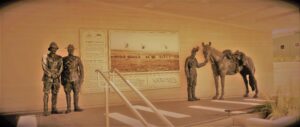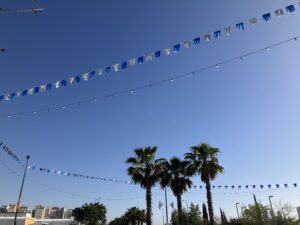As human beings, we don’t like to admit that we are wrong, and we especially don’t like to admit that we are sinners. But we do like to feel special, important and valuable. Our human nature loves control and power. This is also the reason that nations go to war with each other, or why brothers from the same family might stop speaking to each other.
Of course, you will not be surprised to know that 2,000 years ago the situation was not so different – religious hypocrisy and corruption were widespread back then too. When the love for power and control is mixed with religion, it becomes destructive and leads to pride and corruption. Is it possible that the Rabbis accused Jesus and his followers of idol worship because they feared that if people believed in Jesus, they would lose all their power and status?
Historical researchers have been able to find approximately twenty historical sources such as the Dead Sea Scrolls, Josephus, and rabbinic writings that detail the corruption among the leaders of the people of Israel during the Second Temple period. A good example of this can be seen in the strong criticism found in the Babylonian Talmud, Tractate Pesahim 57, against the corruption of the priestly families in the Land of Israel.
And even in the Old Testament period, God often rebuked the religious leaders of the people of Israel. The Sages were not immune from this hunger for power and control either. See for example what is written in the Talmud, tractate Erubin: “Whosoever disobeys the writers (rabbis) deserves death…” The rabbis demanded the death penalty to anyone who dared to defy them. The desire for power and control is the motivation behind these kinds of statements. But Jesus did not disrespect the Law of God. He did not do anything, say anything, or teach anything contrary to the Law. The truth is that He said: “Do not think that I have come to abolish the Law or the Prophets; I have not come to abolish them but to fulfill them.” (Matthew 5:17)
On the other hand, He completely rejected the traditions that were invented and hallowed by the rabbis of His day, what the rabbis call the “Oral Law”. Jesus knew that tradition produces religion, and that religion distances us from God, and leads us to focus on what is unimportant – on meaningless deeds. You might be surprised to learn that in the Talmud there are 3,000 laws on how to plant zucchini (squash), and that is even before we start to talk about how to cook or eat them. Jesus understood that the religious leaders in Israel focused on what was superfluous, and not on the essence – that they missed the heart of God. Jesus knew that the traditions they were inventing were not based on the scriptures, but based on fear and on their need to control the people. Or in other words, religious coercion.
Jesus reminded us what religion caused us to forget. God sees our heart; He is not impressed by all the particular positions we may adopt when we read from a prayer book. The angle in which we wrap our tefillin (phylacteries), might impress the people around us, but it doesn’t impress God.
According to Jesus’ observation, while they wore elegant clothes on the outside, deep inside, the hearts of the religious people of His day were rotten and far from God. He even called them “whitewashed tombs”. All they were interested in was position, power, control and money. And as we all know, in regards to this issue, the situation today is not much different… just open the newspapers and see.
But just for a minute, let’s forget about history. Imagine that the Messiah came today. Imagine what would happen if He approached the members of parliament, the Prime Minister and the President (the leaders of Israel today) and challenged each one of them with a list of all their sins, deceptions and the crimes that they have committed against people and against God. What do you think their reaction might be towards this Messiah? Would they be happy and thank Him for coming to show them where they have been going wrong? Would they immediately agree to correct their ways? Probably not. Most likely they would try to protect their honor and tell the people: “Do not believe Him! He is a liar and a an inciter of hatred! He can’t even be Jewish and doesn’t belong here with us – away with Him!”
This was exactly the reaction among the leaders in the time of Jesus, but back then, the ones with all the power in their hands were the religious leaders rather than politicians. The religious leaders didn’t like the fact that Jesus was jeopardizing their authority among the people. They were concerned about their honorable positions in the synagogues and the Sanhedrin. They were afraid that the people would stop admiring and respecting them. They didn’t want to give up the luxurious, comfortable lives that they had, so they decided to turn the people against Jesus, and therefore rejected the Messiah.
King David says, in Psalm 118:22: “The stone that the builders rejected has become the cornerstone.” It is interesting to learn that the ancient Jewish community of Essenes living in Qumran interpreted this verse as a messianic prophecy right before the time of Jesus. The builders, who are the people of Israel, would reject the Messiah. Hundreds of years later, in the New Testament, the apostle Peter interpreted this verse in the exact same way – that it was about Jesus.
That is why, to this very day, the question of whether Jesus is or isn’t the Jewish Messiah is not even considered a valid question – anything that a rabbi writes about Jesus will be based on prejudice, and the assumption that Jews should not be allowed to read the New Testament. Bound by this same prejudice, other Jewish people will often also come to the same conclusion; that Jesus is not the Messiah. Just like a blind man leading a blind man, if there is a deep hole in their way, they will both fall into the same hole.
The rabbis don’t want you to know about Jesus, and for 2,000 years they have been dealing with how to conceal the truth about the most famous Jew in the entire world, and the greatest secret of Judaism.

ANZAC Day and the Antipodean Heroes of Beersheba
April 25 of each year is ANZAC day, commemorating the brave Australians















